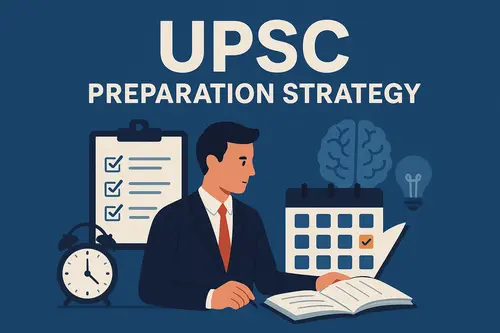
Preparing for the UPSC Civil Services Exam? You’re not alone. Every year, lakhs of aspirants compete for a few hundred seats. However, with the right strategy, you can beat the odds. In this post, we’ll show you how to create a smart and effective UPSC preparation plan that works—from Prelims to Interview.
UPSC Exam Pattern
Before diving into books, know the exam stages which are crucial for UPSC Preparation:
The Civil Services Examination will correspond of two consecutive stages-
i) Civil Services( preliminary) Examination( objective type) for the selection of campaigners for the
Main Examination- Prelims will have two papers- General Studies (GS) and CSAT.
ii) Civil Services( Main) Examination( Written and Interview) for the selection of candidates for the different Services and posts. Mains will have 9 papers as follows: Essay, GS I-IV, Optional I & II, 2 Language papers.
Note: Download the Examination pattern from below.
UPSC Syllabus
The syllabus is something which is the most important thing because of many GURUS found at every nukkad of streets of Coaching hubs like Mukherjee Nagar in Delhi had made things complex and confusing for most of the budding aspirants. At every corner there is some new addition to syllabus of the UPSC not just the physical world but the social media has took the task of modifying syllabus in their own way like there are many facebook and instagram pages which will ask a tricky question and then it is written that this question was asked in UPSC. So, For an UPSC aspirant, the most important weapon to hit the birds’s eye is UPSC Syllabus.
Prelims syllabus is quite vague so aspirants should always do integrated study of both mains and prelims and the pattern too says it all. Do watch Latest post of InfoTrigg on UPSC PYQ’s analysis for more clarity on PYQ’s. Always stick to the syllabus “nothing more nothing less” and it has worked for all the successful officers. Take few days and Learn the whole syllabus and relate it to the current affairs to top the exam.
Download UPSC CSE syllabus from below.
Choose Optional mindfully
Optional is something which can make or break the whole upsc ranking as well as shortlisting game. Optional paper 1 & 2 together makes 500 marks in Mains examination as part of paper 6 & 7.Even 1 mark can twist the results in different way but having a good command on optional will list your name in the holy PDF. But then the question arises, How to choose Optional? Keep these points in mind while choosing an optional-
- Always choose an Optional in which you have upper hand or more understanding of the subject.
- Ensure that you have an interest in that subject because at the end you’re going to give 100’s of mocks on that subject only that’s why interest is important.
- Don’t follow the crowd and choose what seems easy for you like your bachelor’s subject can work well too.
- Ensure that the Subject that you’re choosing has enough resources in the market which is important for preparation.
- Plan for at least 4 months to complete Optional once.
Download the list of optional and syllabus for different optional.
Create a Realistic Study Plan
Many aspirants sets unrealistic goals like working for 15-16 hours but it is a general fact that you cannot study consistently for this much of hours. Instead, plan to study consistently for 5-6 hours with immense focus. You need a timeline, not just a to-do list. Ideally, for UPSC Preparation, start preparing at least 12 months before Prelims.
Tip: Use a monthly and weekly planner. Track your progress.
Stick to the Right Sources
Don’t read everything. Read one source multiple times instead of many sources once.
Here are must-read books:
| Subject | Book |
|---|---|
| Polity | Laxmikanth |
| Modern History | Spectrum |
| Geography | NCERTs + GC Leong |
| Environment | Shankar IAS+ 12th class Biology(last 2 chapters) |
| Economy | NCERT + Sriram notes |
| Current Affairs | Newspaper + monthly compilations |
For newspapers, prefer The Hindu or Indian Express. Write your newspaper notes daily.
Make Smart Notes and Revise Often
Significance of modification in UPSC Preparation Information Retention UPSC syllabus is vast and detailed. Without regular modification, indeed well- understood generalities fade over time. Interlinking generalities modification helps you connect motifs across subjects( e.g., Polity Current Affairs Economy), which is pivotal for both Prelims and Mains. Revision helps in-
- Error Reduction– Reconsidering mock tests and notes minimizes silly miscalculations and clarifies dubieties, especially for factual questions in Prelims.
- Revision boosts Confidence– As Frequent modification reinforces what you know, reducing test anxiety and perfecting tone- assurance before the paper.
- Effective Answer Writing– For Mains, modification helps in recalling applicable data, exemplifications, and structuring your answers more under time pressure.
- Time Optimization– The further you revise, the briskly you recall and apply generalities — critical in an test with strict time constraints.
Follow the 10-7-3-1 modification Rule – revise each content after 10, 7, 3, and 1 day( s) of first reading to strengthen memory retention.
Create concise, topic-wise notes. Use bullet points, charts, and flowcharts. Digital tools like Notion or OneNote can help.
Practice Answer Writing Early
UPSC rewards structure and clarity.
- Start writing GS answers after 3 months.
- Use the Intro – Body – Conclusion format.
- Time yourself. Try past-year questions.
- Join a test series (like Vision IAS or ForumIAS).
For Mains, content matters—but so does presentation.
Don’t Ignore CSAT and Essay
Many fail Prelims because of CSAT. Practice it weekly. Solve 10 years PYQ’s for CSAT and practice similar questions and also there many freely available youtube video series for CSAT preparation that can tak3e you many steps forward in your UPSC journey. Learn tricks to do patterns solving, Numericals and many more in few seconds.
For essays:
- Read good samples
- Build quotes, facts, and examples
- Practice 1 essay per week
Remember, both CSAT and Essay are qualifying—but they’re crucial.
Take Mock Tests
Mocks improve speed, accuracy, and confidence.
- For Prelims: Start 3 months before exam. Take 1–2 mocks per week.
- For Mains: Write full-length tests under time limits.
Analyze your mistakes. Improve with every test.
Stay Consistent, Stay Calm
UPSC is a long journey. You’ll feel low at times. But don’t stop.
Here’s what helps:
- 7–8 hours sleep
- Meditation or exercise
- Digital detox for a few hours daily
- Talking to mentors or peers
Remember: Discipline > Motivation
Avoid These Common Mistakes
- Ignoring CSAT or Essay
- Switching too many books or strategies
- Delaying answer writing
- Studying 14 hours a day without breaks
UPSC is a marathon. Not a sprint.
“Cracking UPSC is possible with the right plan, smart work, and self-belief. Focus on quality, not quantity. Trust your process. Stay consistent.”
Want a FREE monthly study planner PDF?
Drop your email below or join our Telegram group and do check our other posts related to UPSC.
FAQ’s
Start with understanding the exam pattern and syllabus, choose optional wisely, and follow a realistic study plan with regular revisions.
Some essential books include Laxmikanth for Polity, Spectrum for Modern History, NCERTs and GC Leong for Geography, Shankar IAS for Environment, NCERTs + Sriram notes for Economy, and newspapers for Current Affairs.
Pick a subject you are strong in or have interest in, has sufficient study material, and allows you to score consistently in mocks.
Practice answer writing regularly using Intro-Body-Conclusion format, revise topic-wise after 10-7-3-1 days, and make concise notes with flowcharts and bullet points.
Allocate fixed weekly time for CSAT and Essay, integrate Prelims and Mains preparation, track progress with planners, and take regular mock tests to improve speed and accuracy.

this will help a lot